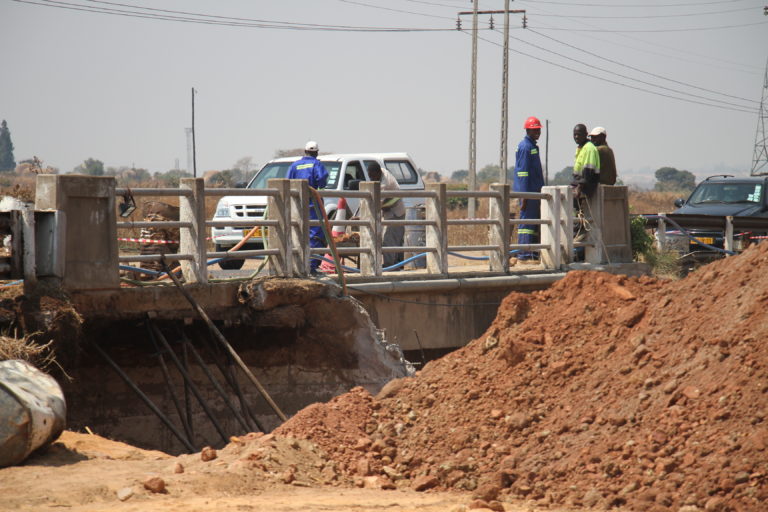HARARE, ZIMBABWE — In 2015, at the age of 14, Mirirai Chaunza lost her parents and two siblings in a road accident in which a bus they traveled in tumbled over after hitting a huge pothole along Harare-Beitbridge road as the family traveled from neighboring South Africa.
Now, Mirirai who survived the disaster — domiciled in Harare, the Zimbabwean capital, is the only one left in her family.
To her (Mirirai), the blame rests solely on Harare-Beitbridge highway, due to its derelict state.
“Potholes, narrowness of the road, and all other factors related to the bad shape of the highway has contributed to the loss of so many lives along the highway,” said now 19-year old Mirirai.
Over the years, the Harare-Beitbridge highway has been earmarked for a facelift, with government conducting a number of groundbreaking ceremonies to commence work on the country’s busiest road which connects a number of African countries to South Africa.
Just before his ouster in 2017, late Zimbabwean President Robert Mugabe had conducted another groundbreaking ceremony to mark the beginning of works on the popular road, but that never took place anywhere.

Soon after seizing power from Mugabe, President Emmerson Mnangagwa also took to conducting another groundbreaking ceremony to commence work on the Harare-Beitbridge road.
Still, nothing meaningful has happened on the country’s busiest yet deadliest road ever, according to development experts like Millicent Muhombekwa.
“Even as several groundbreaking ceremonies have been held to make sure work commences on roads like Harare-Beitbridge, nothing has really happened so far save for potholes and small tributaries that have begun to emerge on the highway,” said Muhombekwa who holds a degree in development studies from the Women’s University in Africa here in Zimbabwe.
Not only does this country have to contend with poor roads, but the infrastructure at public hospitals as well.

For instance, at Parirenyatwa General Hospital, Zimbabwe’s biggest hospital in the capital Harare, the mortuary has become too small to accommodate the dead bodies stashed and piled in the mortuary daily.
“Bodies have to be arranged even on the floor because they can’t fit into the mortuary trays which only accommodate a few bodies; it’s so sad and disgusting,” said a mortuary attendant who requested to remain anonymous for professional reasons.
At the maternity side of the Parirenyatwa hospital, most toilets are broken down and expecting mothers have to bring their own buckets in order to then fetch water to use in maternity wards’ water system ablution facilities.
“Everything about our public hospitals is broken down and dysfunctional; the entire national public hospitals infrastructure here needs complete overhaul in order for the system to work all over again,” an anti-government activist, Elvis Mugari said.
But, even as activists like Mugari are for the overhaul, still, the road to do it is not an easy one.
As such, there are 214 hospitals in Zimbabwe of which 120 are government hospitals run by the Ministry of Health and Child Care while 66 are mission hospitals, with the remaining 32 being privately run.
Meanwhile, laden with a population of approximately 16 million people, Zimbabwe’s government hospital system includes six central hospitals, eight provincial hospitals, and 63 district-level hospitals, with the rest being rural hospitals.
At Harare Central hospital, with the hospital infrastructure falling apart, even work for the medical staff has been made difficult.
“Imagine coming here to attend to a patient who is admitted, but in a ward with a broken ceiling above, broken windows and cracked floors with potholes; it’s pathetic,” said a senior medical doctor working at Harare hospital, requesting to remain anonymous for professional reasons.
Despite inheriting one of the best infrastructures at independence, Zimbabwe’s hospitals have over the decades failed to perform at expected levels like in years before independence due to the country’s struggling economy.

Other public hospitals like Neshuro in Mwenezi district south of the country, hardly have running water, with communities in the vicinity of the hospital having to bring water for their admitted patients.
So, to local secondary school teachers in Mwenezi like 46-year old Denis Muzondi, a History teacher at one of the secondary schools in the impoverished districts, Zimbabwe’s healthcare system is in a dire state of decay.
“Our public healthcare infrastructure is on its way to the Iron Age era; we are making history in reverse gear, meaning we are on a return leg to the olden past instead of moving forward in terms of our public healthcare infrastructure,” said Muzondi.
In fact, according to structural engineers in Zimbabwe’s public service like Edwin Mhungu based in the capital Harare, ‘roads and hospital infrastructure are equally derelict across most places countrywide and generally unfit for any use.’
“The condition of Zimbabwe’s road network had deteriorated since the last condition survey a decade ago in 2010,” said Mhungu.
According to the Ministry of Transport and Infrastructural Development, only 10 percent of the country’s surfaced (tarred) national road network is in good condition, with 30 percent in poor condition while 57 percent is in fair condition.

Yet, making the country’s road network look better would cost a fortune, according to infrastructural financiers in the African region.
Therefore, according to the African Development Bank’s Action Programme for Infrastructure that runs until 2030, Zimbabwe requires 34 billion USD throughout the next decade, meaning Zimbabwe requires approximately 3.4 billion USD every year for the next 10 years to build robust infrastructure in order to catch up with its regional counterparts.
African Development Bank (AfDB) has been on record saying Zimbabwe’s road maintenance alone would require 43 million USD.
As such, for orphaned young women like Mirirai Chaunza, due to the derelict Harare-Beitbridge highway which claimed the lives of the entire members of her family, hope has slithered away.
“Maybe just like my parents and siblings, I will perish on the road one day,” Chaunza said.
















